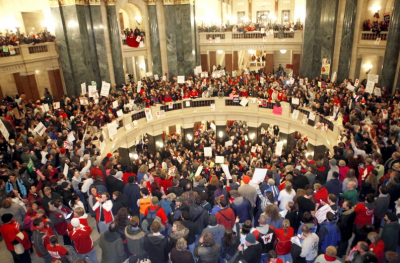It was somewhat expected but still not great news from Wisconsin last night. It does suggest that, despite many prominent voices to the contrary, Occupy has had the better read on tactics after all. As we should have learned, there’s no short-cut here. Would a Democratic governor even have been able to abolish Walker’s law, let alone improve things? The hope remains with the social movements, even if that seems attenuated now,
As no one will need reminding, the 2010 elections returned Scott Walker as Governor of Wisconsin. In the manner of George W. Bush, he swung hard right after the election and introduced one of the most sweeping anti-collective bargaining laws anywhere. Led by students, organized labor quickly moved to resist, occupying the Capitol building.
The Madison occupation of February 2011 was a great moment. It claimed the right to be taken into account and the right of the people to actually be present in what is known as “the people’s house,” the Capitol building. In what became a precedent for later public space occupations, the occupation was ended by quasi-legal force of law after only a few weeks.
Late in 2011, unions and the Democratic Party decided to attempt to recall Gov. Walker. In a very short space of time from November to January 2012, a million signatures were gathered, a remarkable accomplishment by any standards. There were those who thought that the Occupy movement as a whole should pursue such electoral goals.
However, when I was in Madison in April, you could already feel a sense that the situation had slipped out of the movement’s control. The Democrats failed to coalesce around a candidate and held a divisive primary as late as May 8, choosing the same man, Tom Barrett, who had lost to Walker in 2010. Whatever Barrett’s merits, the election looked like a replay, rather than a referendum on collective bargaining rights or democracy.
Unsurprisingly, perhaps, the nascent global social movements, skilled in the “local” work of holding public space, demonstrations and organizing their own have proved less accomplished in mass electoral theater. Almost by definition, movements that take their energy from direct democracy don’t transfer to mass manipulation, sound bites and fund raising, the very cynical maneuvers they are against.
The Egyptian Presidential election is a case in point, where pro-revolutionary candidates gained the majority of the votes but failed to make the run-off. The Wisconsin election showed almost no change from the 2010 precedent. I don’t think it was the money or anti-union bias, so much as a sense that what Walker had done fell within the purview of electoral democracy. His Thatcherite neo-liberalism recalls precedents like Reagan firing the air-traffic controllers in 1981 or Thatcher abolishing the Greater London Council in 1986. Both were clearly extensions of what had hitherto been considered standard practice but they did not breach the letter of the law.
So what we are seeing is an extension of electorally-validated authority beyond what is taken to be the norm. Precisely because such norms are largely unspoken, there is very little preventing someone who wants to do so from extending their authority, as long as they can corral the necessary votes. In the UK, this elected force of law has long been standard via the “whip” system, in which parties require their members to vote as they want them to do, or face expulsion. What gives the current US system its peculiar feel is that its mechanics are so based on consensus within a narrow ruling elite that it is surprisingly easy for a determined party, whether formally in government or opposition, to drive the agenda.
The simple lesson for social movements is that you can’t win battles against those who have defined the very way that battles should be fought. You have to change the way, not that battles are fought, but the way that people think about their relationship to the social. If it’s about battles, those without the monopoly of violence tend to lose. If it can become about changing how we understand ourselves, what the purpose of life might be and how to enlarge the possibilities for all, then sometimes very surprising things can happen.
What happens next depends very much on whether finance capital manages what it has so far been unwilling or unable to do: to restrain and reform the banks and their markets. The Eurozone crisis suggests that the mechanisms of debt on which the endless circulation of capital is based are so flawed as to be beyond repair within the present neo-liberal framework. The US economy is slowing to halt, even China and India supposedly exempt from market cycles because of their endless supplies of free labor have slowed. Don’t be depressed: imagine something completely different. And go and make it happen.

